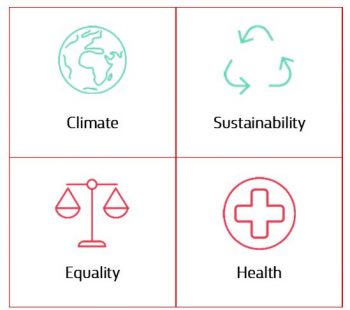Good COP, bad COP

17th November 2021
August 2021 saw the release of a landmark scientific report from the UN’s Intergovernmental Panel on Climate Change (IPCC). It issued a “code red for humanity”, confirming the disastrous consequences of inaction on climate change.
The report was commissioned ahead of the 26th Conference of Parties (otherwise referred to as COP26) which took place in Glasgow. The UK hosted leaders from nearly 200 nations to discuss climate objectives and revisit the commitments made as part of the 2015 Paris Agreement – namely to limit global temperatures from rising by more than 1.5C and have net zero greenhouse emissions by 2050. It was perhaps the most crucial UN Conference to date.
We now know the proposals from 2015 are insufficient to meet the 1.5C target. Sir David Attenborough used his attendance to remind politicians that humanity is “already in trouble” on climate change.
One challenge of COP26 was always going to be reaching a consensus
The challenge of the conference was always to find consensus between countries, to build shared momentum towards more ambitious emissions targets. These same countries have spent years pointing the finger of responsibility at each other. Some of the worst polluters argue that the onus is on developed nations who can afford to cut emissions. The White House makes the reverse case, noting that China’s carbon dioxide emissions are nearly double that of the US.
On the second day of COP26 the US pledged to cut methane emissions by 30% by 2030, compared with 2020 levels. Although carbon dioxide is considered the most harmful, long-term greenhouse gas, methane is second. While many countries signed up to the same pledge, there were three notable absences from the largest methane emitters: Russia, India, and China.
A total of 132 also pledged to reach net zero emissions by 2050, but once again there were the same three absences. China has loosely agreed to hit carbon neutrality by 2060, although it has not provided any firm details. Russia has agreed to reach net zero by 2060 but has not legally ratified this commitment. Finally, India has promised to hit net zero emissions by 2070.
As well as methane, over 100 nations agreed to tackle deforestation and there were new initiatives covering the clean energy transition and UK financial institutions.
The efforts of world leaders at COP26 prompt questions about how all industries and areas of society can play their part. Today, some of the fastest growing start-ups in the world revolve around tackling climate change, whether through existing technologies or newer, innovative approaches. Here, investors hold the power to direct capital towards “green tech”, bringing urgent reductions to carbon emissions as well as new economic opportunities.
Greenwashing
As delegates inside Glasgow’s SEC centre discussed private sources of funding for climate initiatives, protestors marched outside against “greenwashing” – when companies fail to match promises with action.
The hope is that the PR-chasers enjoy short-term plaudits but are soon found out. In carbon intensive industries (such as energy production, logistics, farming, and airlines) there are reasons to be optimistic. Given the momentum of international discourse and awareness, environmental leaders are more likely to gain market share from the laggards.
Investors too are likely to back companies who are committed to solving the problem, rather than contributing to it.
Investing in the right way
For investors, there is clearly much opportunity – both to be active participants in the climate challenge, and to back technologies, companies and sectors making a success of that challenge.
Sustainable investing needs to align objectives with positive outcomes
Navigating the investment landscape presents its own difficulties. Finding suitable investments means ensuring an accurate alignment of (sustainable) objectives and (positive) outcomes. A robust screening process becomes a core part of long-term success.
Edison’s sustainable ethos
At Edison, we believe that wealth is a means to an end, not an end in itself. We see ourselves as trusted long-term stewards of our clients’ wealth with responsibility at the centre of how we operate. We believe that Environmental, Social and Governance (ESG) factors can have a material impact on investment outcomes.
These factors are part of taking a broader, long-term perspective on assessing risk. Significant instability in weather systems, higher cost of food production, social unrest, poor access to goods and services, are all outcomes of ignoring ESG in how we think about the world. These outcomes are a threat to humanity, society and, in the short term, the economy. Cynically put, they are bad for business.
Investing sustainably is about using your portfolio to support responsible business practices. It casts a vote in favour of finding better outcomes for society and the environment and identifying opportunities that solve many of the world’s biggest challenges. We invest in a way that is aligned with a set of positive values and beliefs whilst also achieving key financial objectives. With a sustainable approach to investing, doing well and doing good can be achieved together.
Edison and sustainable investing
We have screened and managed strategies with a sustainable focus since 2009. Our experience has been distilled into the robust, diversified, range of strategies we offer today. Three core components help us to deliver our sustainable aims:
- Focusing on positive impacts and outcomes
Impact investing supports companies that generate a positive social or environmental return alongside a financial return. They are tackling the world’s biggest environmental and social challenges. Our fund selection process captures the best of both worlds.
- Aligning with the UN’s long-term goals
The United Nation’s 2030 Agenda for Sustainable Development provides a shared blueprint for peace and prosperity for people and the planet, now and in the future. At its heart are 17 Sustainable Development Goals (SDGs), which are an urgent call for action by all countries. Using the UNs SDGs, we have developed our four pillars of sustainable investing:

Two pillars capture environmental issues and two target human and societal themes. With these pillars, we can assess and select investments which are making a significant positive global impact towards a recognised goal. The timescales are within the next decade – rather than in 40-, 50- or 60-years’ time.
- Promoting stewardship and engagement
We think that the role of a sustainable fund does not stop once it has made an investment. Recognising this, we build on the data collected as part of our fund analysis to assess the level of ‘stewardship’.
Stewardship is an integral part of active share ownership, which the UN finds to be one of the most effective means to help firms minimise risks and maximise returns. The funds we invest in will hold hundreds of meetings every year with the executive boards of their investee companies. In doing so, they hold enormous power to shape the conversation and highlight their own perspective on ESG risks.
To understand the fund and firm-level approaches to stewardship, we perform qualitative analysis on their engagement and voting practices.
Bringing it all together
Our sustainable investment strategies undergo quantitative screening processes which have supported our strong long-term performance. Our current approach gives clients the opportunity to invest in companies making positive contributions to the climate, green tech, healthcare, energy, and education – an ambition to make the world a better and fairer place, whilst meeting all the same financial goals.
We also hold sustainable funds to the same high standards of investment performance as our ‘core’ approach. And since 2009, there have been remarkably similar returns, albeit with sustainable strategies exhibiting slightly higher volatility. Like with any investment decision, it is important to take a rational view. What is the potential return and what is the risk? What COP26 reminds us is that the risks have widened – ignoring them could pose a long-term threat to both returns and the planet.
<< Back to Insights
Contact us to see how we can help.
+44 (0) 20 7287 2225
hello@edisonwm.com
The value of investments and the income arising from them can go down as well as up and is not guaranteed, which means that you may not get back what you invested. Past performance is not necessarily a guide to the future. The information contained in this website does not constitute advice. The FCA does not regulate tax advice. The FCA does not regulate advice on Wills and Powers of Attorney. The Financial Ombudsman Service is available to sort out individual complaints that clients and financial services businesses aren’t able to resolve themselves. To contact the Financial Ombudsman Service please visit www.financial-ombudsman.org.uk.



